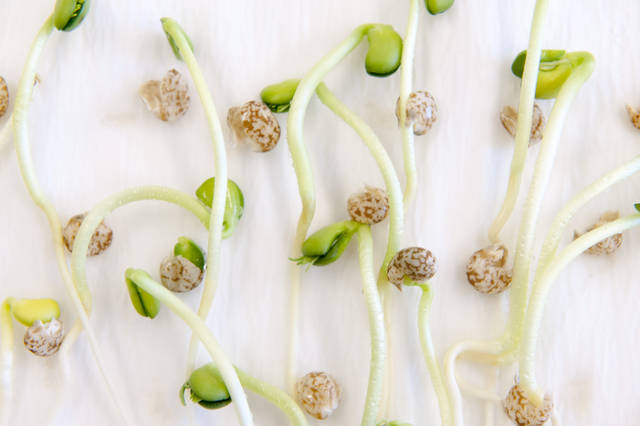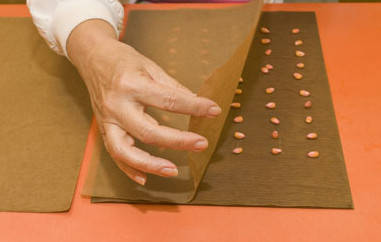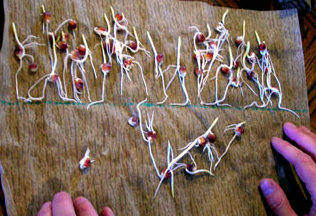Lauren asks: I planted some pepper seeds in my garden that never came up. What could be the reason they didn’t germinate? What can I do that might encourage germination in the future?
Tropical Gardener answer: Pepper seeds often take a while to germinate. You may just need to wait a bit or try some of the techniques described here to get them to sprout. Though most seeds have less than a 100 percent germination rate, a zero germination rate is unusual. Several factors listed below can hamper seed sprouting.
1. The seeds may be old. Check the date on the seed packet. Small seeds can lose viability within a year or less. It’s always a good idea to check the date and then test the germination rate before you go to the trouble of planting out your seeds.
To test for the germination rate, take five or 10 seeds and place them between two wet paper towels. Let the towels dry a bit but keep them damp (not wet) for a few weeks or until a few of the seeds sprout. You can even slip them into an open-ended plastic bag to maintain moisture. A wide variety of techniques for seed testing with paper towels is available online if you want to try several methods. In this controlled setting, you’ll be able to see how many seeds sprout. If five out of 10 sprout, you have a 50 percent germination rate. If three out of five germinate, the rate is 60 percent. Then you will know how many seeds you need to sow to get the desired number of plants.
2. A critter may have eaten your seeds. Birds, rats or roaches are among those that might find and eat your seeds before they germinate. Start seeds in a critter-free environment to avoid this issue.
Once seeds do germinate, slugs or snails may chew the seedlings off at the soil line thus killing your plants before they even get started. You can remedy this problem by planting in an environment protected from slugs or by spreading low-toxic slug bait in your garden. Be sure to buy the bait that is labeled “pet safe” in outdoor settings where birds or pets might eat it.
3. The soil the seeds are planted in may be too wet or too dry or may contain something toxic to the seeds or the resulting seedlings. The best way to avoid this issue is to avoid direct seeding in your garden and to plant in a more controlled environment. A pot or six-pack filled with seeding mix or sterile soil will work. Be sure to keep the medium moist but not wet until germination happens. Be sure slugs, bugs, birds or rodents cannot get to your seeds or seedlings.
Once your seedlings appear, allow them to put out their initial seed leaves (cotyledons) and then a few true leaves. Once they look strong, you can consider placing them in the garden but do protect them from critters until they are big enough to self-protect.
If you have had trouble in the past with seeds not germinating, one or several of these issues may be the reason. The best advice is to baby your seeds. Test their germination rate first, and then coddle them by planting in an environment that will optimize their chances of germination and good health. Fertilizing them lightly while waiting for them to gain strength will also help them thrive in your garden.
If you are planting seeds for root crops like carrots, beets or turnips, you need to direct seed these in your garden. Root crops do not transplant well but they can be germination tested and then planted directly in the garden accompanied by lots of coddling protection until they get going.
Know that you can get seeds from the Community Seed Library at the Kailua-Kona branch of the library. The packets have dates and the source listed. Be sure to look at those as you select seeds. Five small packets of seeds are available per visit to anyone who is a member of the CSL. Membership forms are available at the library and membership is free. Happy seeding.
Email plant questions to konamg@ctahr.hawaii.edu for answers by Certified Master Gardeners. Some questions will be chosen for inclusion in this column.
Diana Duff is a plant adviser, educator and consultant living in a dryland forest north of Kailua-Kona.
Gardening Events
Saturday: “Work Day at Amy Greenwell Garden” from 9 a.m. to 12:30 p.m. Meet at the Garden Visitor Center across from the Manago Hotel in Captain Cook. Volunteers will be able to help with garden maintenance and are invited to bring a brown bag lunch. Water and snacks provided. Call Peter at 323-3318 for more information.
Farmer Direct Markets
Wednesday: “Hooulu Farmers Market” 9 a.m. to 2 p.m. at Sheraton Kona Resort &Spa at Keauhou Bay
Saturday: “Keauhou Farmers Market” 8 a.m. to noon at Keauhou Shopping Center
“Kamuela Farmer’s Market” from 7 a.m. to noon at Pukalani Stables
“Waimea Town Market” from 7:30 a.m. to noon at the Parker School in central Waimea
“Waimea Homestead Farmers Market” from 7 a.m. to noon next to Thelma Parker Gym in front of Thelma Parker Library.
Sunday: “Pure Kona Green Market” 9 a.m. to 2 p.m. at Amy Greenwell Garden in Captain Cook
“Hamakua Harvest” 9 a.m. to 2 p.m. at Highway 19 and Mamane Street in Honokaa.
Plant Advice Lines
Anytime: konamg@ctahr.hawaii.edu
Tuesdays and Thursdays: 9 a.m. to noon at UH-CES in Kainaliu: 322-4893
Mondays and Fridays: 9 a.m. to noon at UH CES at Komohana in Hilo: 981-5199 or himga@hawaii.edu








